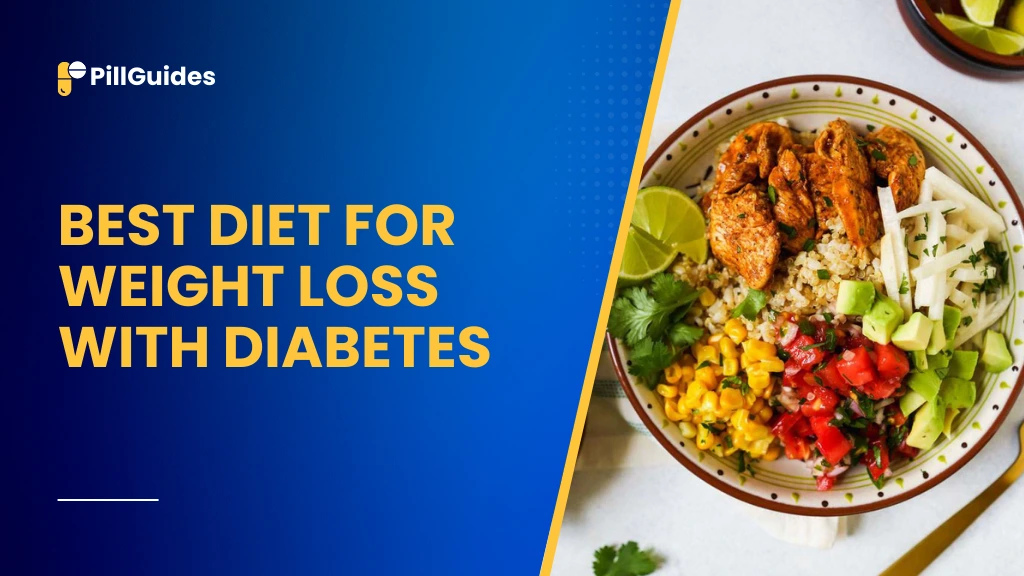A diabetes weight loss plan may be a daunting prospect, but with some careful planning, it can be done. When it comes to a diabetes-friendly weight loss strategy, the focus is to ensure that blood sugar levels are under control while maintaining a healthy weight loss. Nutrient-dense foods, mindful portion sizes, and keeping day-long energy levels stable are the hallmarks of the best diet for weight loss with diabetes.
This diabetes-friendly diet guide will walk you through how to lose weight with a diabetes-friendly diet, foods to include and avoid, effective meal plans, and practical tips for success. If you have type 1 or type 2 diabetes, this article will give you the tools to manage your health.
Why Weight Loss Matters for Diabetes Management
Weight loss is beneficial for people with diabetes, particularly for those with type 2 diabetes. The extra weight, especially abdominal fat, is a big contributor to insulin resistance, which is where the body has trouble regulating blood sugar. Even modest weight loss of 5% to 10% of your body weight can lead to:
- Improved insulin sensitivity.
- Lower blood sugar levels.
- Fewer diabetes medications are required.
- Less likely to get complications like heart disease or kidney damage.
Maintaining a healthy weight can also reduce the risk of long-term complications and promote general well-being for somebody with type 1 diabetes.
Core Principles of a Diabetes-Friendly Diet
1. Eat Low Glycemic Index (GI) Foods
Slowly digested low-GI foods make blood sugar rise gradually. There are a variety of reasons that make them perfect targets for lowering diabetes levels and for encouraging satiety.
- Examples: Vegetables, legumes, whole grains, and most fruits (except for onion, dried fruit, and processed foods).
2. Prioritize High-Fiber Foods
Slowing digestion, stabilizing blood sugar, and making you feel full — dietary fiber is important.
- Sources: Berries, oats, quinoa, nuts, seeds, leafy greens.
3. Include Lean Protein in Meals
Proteins also make and repair tissues, and regulate the feeling of hunger.
- Best options: Skinless chicken, turkey, fish, tofu, eggs, and lower-fat dairy products.
4. Eliminate Refined Carbs and Sugars
Refined carbohydrates or white, processed foods cause rapid spikes in your blood sugar and lead to weight gain. Choose complex carbs over refined ones instead.
- Examples: Change white bread and pasta with whole grain alternatives.
5. Incorporate Healthy Fats
Healthy fats can help reduce inflammation as well as protect your heart.
- Sources: Avocados, olive oil, fatty fish, nuts and seeds.
Top Diet Plans for Weight Loss with Diabetes
1. Mediterranean Diet
The key to this heart-healthy diet is whole foods and eating heart-healthy fats and lean proteins.
- What to eat: Vegetables, fruits, olive oil, whole grains, seeds, nuts, fish and legumes.
- Benefits: It supports blood sugar control, fights inflammation, and helps promote weight loss.
2. Low-Carb Diet
There is evidence that you can control your blood sugar spike and promote fat loss by limiting carbohydrate intake.
- Focus foods: Minerals, lean proteins, healthy fats, and low-carb fruits.
- Tip: If your doctor has approved it, you’ll be able to work with them to monitor carb intake safely.
3. DASH Diet
It works for weight loss and diabetes management.
- What it includes: Vegetables, fruits, low-fat dairy, lean protein, and whole grains.
- Benefits: It reduces blood pressure, supports weight loss, and helps improve heart health.
4. Plant-Based Diet
A plant-based diet consists of whole, minimally processed plant foods and eliminates or severely limits consumption of animal products.
- Best options: Whole grains, fresh fruits and vegetables, beans, lentils and tofu.
- Benefits: Excellent for battling weight and blood sugar and having lots of fiber and a few bad fats.
Diabetes-Friendly Foods to Include
- Non-Starchy Vegetables: Green spinach, broccoli, cauliflower, peppers, and zucchini.
- Low-GI Fruits: Apples, oranges, berries, and cherries.
- Whole Grains: Things like oats, brown rice, quinoa and barley.
- Lean Proteins: Fish, chicken, turkey, eggs, and legumes.
- Healthy Fats: Nuts, seeds, and avocado.
- Dairy Alternatives: Low-fat yogurt, cheese, and unsweetened almond milk.
Foods to Avoid
- Sugary Beverages: Sodas, sweetened teas, fruit juices.
- Refined Carbs: Pastries, cookies, and white bread.
- Processed Foods: Frozen meals, packaged snacks, and processed meats.
- High-Saturated Fats: Anything fatty cuts of meat, butter, fried foods.
- Sugary Desserts: Ice cream, candy, and cakes.
Practical Tips for Weight Loss with Diabetes
- Track Your Intake: A food diary or a mobile app can help you record calories, carbs, and blood sugar levels.
- Eat Balanced Meals: In every meal, include a combination of protein, fiber, and healthy fats.
- Avoid Skipping Meals: Keep blood sugar levels in balance by eating regularly.
- Control Portions: Eat mindfully and eat with moderate portions.
- Stay Active: A good combination of this is to combine your diet with physical activity such as walking, swimming, or yoga.
Conclusion
The best diet for weight loss with diabetes is the one that creates sustainable weight loss and maintains blood sugar levels. So diets such as the Mediterranean, DASH, and even low-carb approaches can be good, just make sure you pick one that you can live with. Conjure together your nutritional efforts with usual exercise and function with your healthcare professional to customize your plan for you. If you apply yourself correctly, you can successfully juggle your weight and diabetes so you can have better health.
Disclaimer
This article is for informational purposes only and does not replace professional medical advice. Always consult a healthcare provider or registered dietitian before making significant dietary changes, especially if you have diabetes.
Read More: What is the Difference Between Good and Bad Cholesterol?
FAQs Best Diet for Weight Loss with Diabetes
1. Is weight loss able to reverse type 2 diabetes?
Yes, that means significant weight loss can help make your body more sensitive to its insulin or even relieve you of your type 2 diabetes.
2. What is the amount of carbs I should be eating per day for diabetes to lose weight?
Depends on personal needs but usually 45–60 grams per meal is a good place to start. The advice of a dietitian is recommended if you cannot determine how many of these products are safe.
3. Can fruits be good for someone looking to lose weight who has diabetes?
Yes, and berries, apples, and oranges are of low GI.
4. Is Intermittent Fasting Okay for Diabetics?
Some people may find intermittent fasting works, but as with many protocols, it is not recommended without medical supervision to prevent hypoglycemia.
5. Can a keto diet help you with diabetes?
While a ketogenic diet may improve blood sugar control it isn’t for everyone. Before you begin, consult your doctor.










